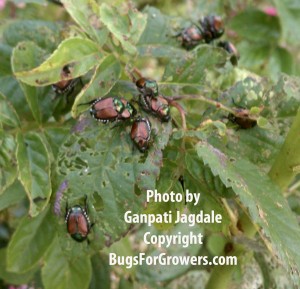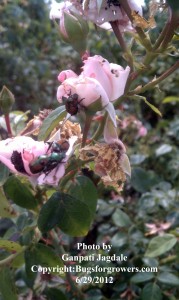Control Japanese beetles, Popillia japonica with three different beneficial entomopathogenic nematodes in fall
The Japanese beetle (Popillia japonica) is one most damaging pests of turfgrass and ornamental plants grown in urban landscapes (Fig. 1 and 2) and golf courses where chemical pesticides are not currently recommended to use for controlling this important insect pest because of their deleterious effects on the human beings, animals and environment. It has been demonstrated that the beneficial entomopathogenic nematodes as biological control agents have a potential to control Japanese beetles.


The best time for the application of beneficial nematodes against Japanese beetle is during the late summer (August) to early fall (September-October) because beneficial nematodes will kill the Japanese beetle grubs/larvae before they move deep into the soil for overwintering. Thus, this targeted preventive application of beneficial nematodes should reduce the emergence of Japanese beetle adults during the next spring.
Following three beneficial entomopathogenic nematode species when applied at the rate of 1 billion nematodes per acre (which is equivalent to 23000 nematodes per square foot area) have been proved to be effective in infecting and killing grubs and pupae of Japanese beetles.
- Heterorhabditis bacteriophora nematodes
- Heterorhabditis indica nematodes
- Steinernema carpocapsae nematodes
You can find more information on the interaction between beneficial entomopathogenic nematode and Japanese beetles at https://blog.bugsforgrowers.com/uncategorized/target-japanese-beetle-larvae-with-entomopathogenic-nematodes-in-the-fall/
Research Papers:
- Power, K.T., An, R. and Grewal, PS. 2009. Effectiveness of Heterohabditis bacteriophora strain GPS11 applications targeted against different instars of the Japanese beetle Popillia japonica. Biological Control 48: 232-236.
